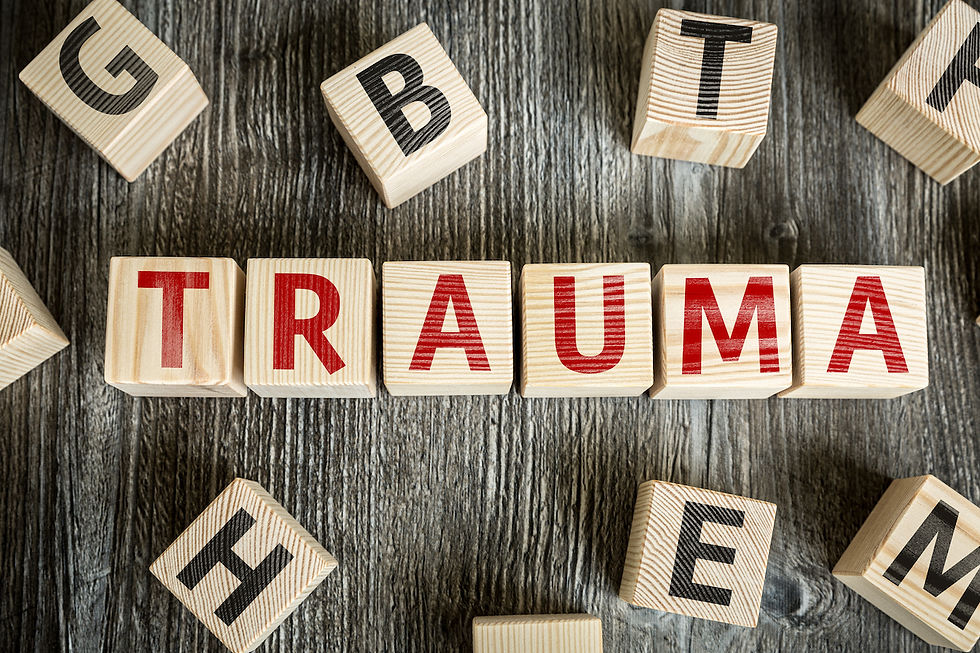The Impact of Unresolved Trauma
- Gary Katz

- May 21, 2024
- 3 min read
Part 1: The Lingering Impact of Unresolved Trauma and Why Resolution is Essential
As a psychotherapist, one aspect of my work that I find particularly crucial is helping individuals navigate and heal from the effects of unresolved trauma. Trauma is a deeply distressing event that can leave lasting scars on one's emotional and psychological well-being.
Unfortunately, when left unaddressed, unresolved trauma can have a profound impact on various aspects of a person's life, hindering their ability to experience true growth and happiness. In this blog post, we will explore the consequences of not resolving trauma and why seeking resolution is essential for one's overall well-being.
Trauma isn’t just something that happens to us. It’s also the story and meaning we make about that event. The internalized messaging that we develop around an event or events. This is why things which happen to us as young children often have such a greater impact than when something happens when we are adults. Our young undeveloped brains don’t fully comprehend what is happening and often internalize an external event being due to our own behavior or lack of worthiness. Over time, this develops into self blame and feelings of inadequacy.
When this is left untreated and unhealed, there can be a number of impacts.
The first impact of trauma that we’ll look at is emotional turmoil.

When trauma remains unresolved, the emotions associated with the event can become trapped within the individual's psyche and body. Unresolved trauma often leads to intense and uncontrolled emotions such as anger, fear, sadness, and anxiety. These emotions may resurface unexpectedly, triggered by seemingly unrelated events, making it challenging for individuals to manage their emotional well-being. Over time, this emotional turmoil can lead to a sense of helplessness and an overall decrease in the quality of life.
Clients may come into our offices seeking help for anxiety, depression, relationship issues, anger issues or addiction issues. These all have to be addressed but they are only symptoms. What really lies underneath these symptoms is unresolved trauma.
When someone shares with me that they have “anxiety” or are “always anxious,” I always ask them to share with me what that means to them and what that feels like inside their bodies. It’s usually one of two things: fear or uncomfortable feelings. If it’s fear, then we’ll dig deeper together to understand why they have the fear and why they are living in a near constant state of fear. It’s usually a symptom of trauma.
If “anxiety” means uncomfortable feelings, then we will look at why these feelings are so uncomfortable for them and the beliefs that generate that discomfort. We will work to widen the window of tolerance to handle big feelings and also understand what they are attached to. Often, internalized beliefs that result from trauma.
Rushing in to prescribing medication for “anxiety” without understanding the underlying causes, just leaves the roots of the “anxiety” untreated and creates new issues that could potentially arise from the usage of medication. Please note, there is nothing wrong with using medication. It’s very important to do so when needed. However, there is a tendency for many doctors, psychiatrists and therapists to jump to prescribe medication to get quick relief for a client’s symptoms and it can often create a long journey of side effects and finding the right medication and dosage while still not treating the actual cause of the anxiety.
No one just suddenly comes down with an addiction. It’s not like a cold. Addictive behaviors are usually learned because they originated as a way to find relief from the impact of trauma.
If you or someone you know is showing signs of the emotional impact of unresolved trauma, please reach out to us to have one of our therapists assist you in finding healing and relief from those painful symptoms.
Next week, we’ll look at the impact of unresolved trauma on relationships.
Do you believe someone you know could benefit from individual therapy or group therapy programs at the Center for Intimacy Recovery?








Looking back on the wedding planning process, using Wezoree to find our photographer was easily the best decision we made. The selection of New York photographers felt carefully chosen, with each profile offering something unique. We found someone whose artistry spoke directly to us, and they exceeded every expectation. They captured the intimacy and energy of our day in a way that feels timeless. Every picture tells a story, and flipping through them feels like reliving those hours again. Wezoree best wedding photographers nyc connected us to an artist who gave us memories we’ll cherish forever, and I’m so thankful.